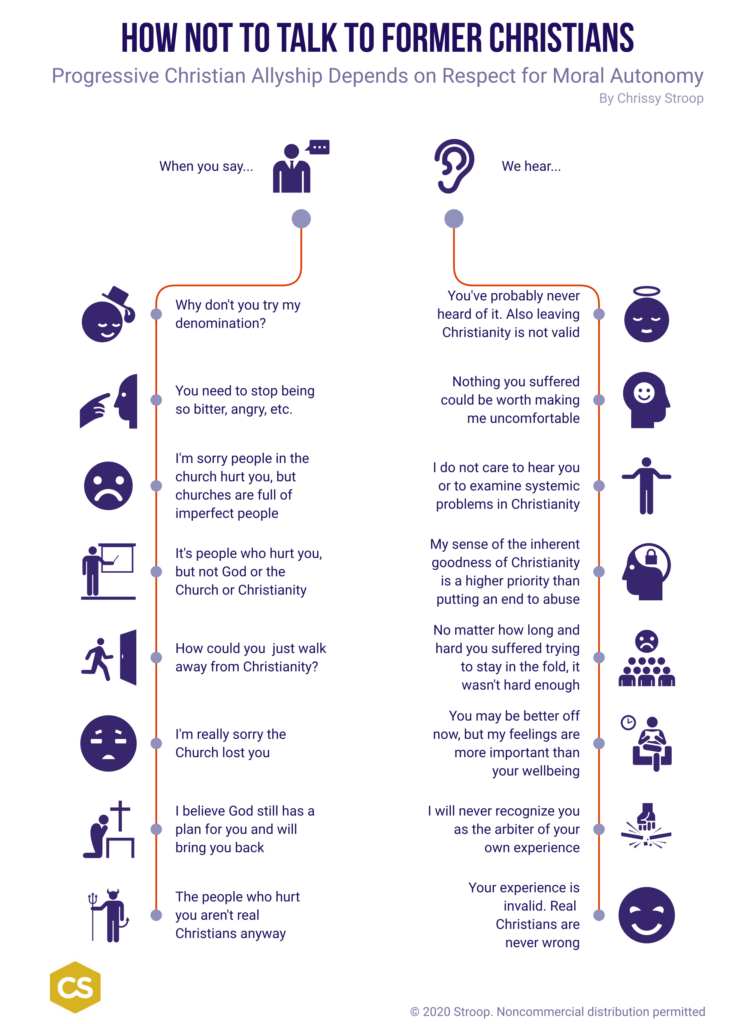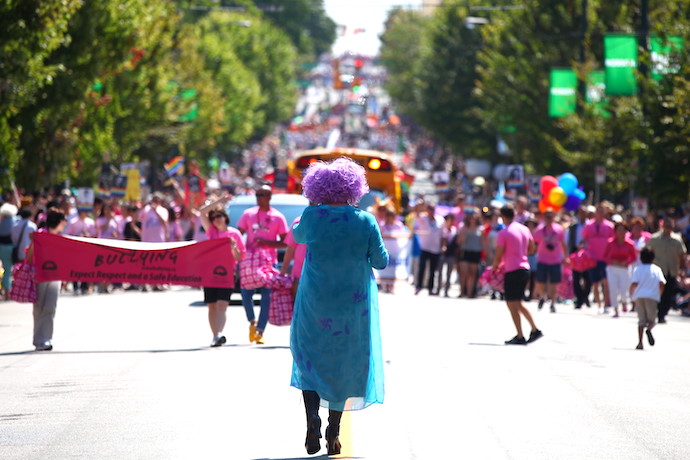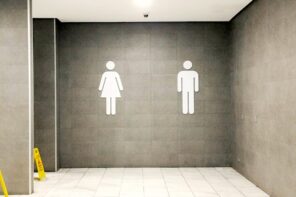It’s Pride Month again! Time for indulging in hope, for flying flags, and for remembering the victims of anti-LGBTQ bigotry as well as celebrating the hard-fought gains that have come since Stonewall, both in terms of legal rights and public acceptance for members of the LGBTQ community. As a dysfunctional America slowly lurches into something like a post-pandemic state, with some local events taking place in person this year, it’s also time, inevitably, for arguments about who should and should not show up to Pride events.
I certainly do not speak for all LGBTQ folks on this issue, nor do I speak for any particular organization. I speak only for myself, and, as a transgender woman and exvangelical, I have exactly one very strong opinion in this regard. Non-affirming Christians should stay away from Pride, and the representatives of individual churches that host booths or floats should be entirely transparent and forthcoming about where their denominations stand on same-sex marriage and LGBTQ-affirmation. (For those unfamiliar with Christian lingo, by the way, “LGBTQ-affirming” refers to the theological acceptance of the full humanity and the full inclusion in church of members of the LGBTQ community, with no restrictions with respect to public-facing or leadership roles.)
Of course, some non-affirming Christians will show up to Pride events. They always do. But it’s not the raving street preachers I’m worried about. They’re at least honest about who they are, and they often find themselves surrounded by “angels,” who drown out their hate. Sometimes, when a street preacher walks around with a ridiculously large banner proclaiming hellfire, someone follows him with a trolling sign that reads e.g. “This guy needs a hobby.” No, I’m more concerned about the Christians who definitely believe that same-sex relationships and transgender identities are sinful, but who deliberately obscure their harmful views beneath messaging focused on love, or even on “apologizing” to LGBTQ individuals for the mistreatment we’ve suffered at the hands of Christians.
If memory serves, it was about three or four years after I started grad school in 2004 that I first learned there are evangelical Protestants—non-affirming, of course—who show up to Pride events and hand out water or snacks. Someone I knew from the Christian school I graduated from told me about participating in one such initiative. At that point, while I had become an advocate of LGBTQ rights, I hadn’t even recognized my own queerness. I had also never been to Pride and had no idea what the parades and festivities were like. Naturally, I couldn’t articulate then why what she described didn’t sit entirely well with me.
Now I can do so easily: these efforts amount to deliberately deceptive bait-and-switch tactics, and they center anti-LGBTQ Christians’ feelings over the feelings, health, and welfare of LGBTQ folks. The same dynamic is in play in megachurches like Hillsong that trumpet that “all are welcome,” while in fact these churches will neither solemnize same-sex weddings nor allow LGBTQ folks to volunteer or serve in leadership roles. For people who are supposedly against the bearing of false witness, non-affirming Christians invested in “respectability” sure are eager to deceive people with respect to their “welcoming” of members of the LGBTQ community.
What’s going on?
In the first decade of the twenty-first century, in some conservative, mostly white evangelical circles there were calls to dial down the culture warring—at least in terms of the rhetoric, if not so much the theology that fueled it, nor the pervasive support for the concomitant anti-LGBTQ, anti-woman political agenda. Perhaps “civility” would lead to better understanding, the thinking went, and “building bridges” would get the queers back to church, where they would learn to be straight or, failing that, that God was calling them to be celibate.
It’s not clear how widespread such evangelical initiatives are at Pride events these days, but the practice certainly hasn’t died out. And last month, Christopher Smith, a Washington, DC-based Jesuit scholastic* who’s fully on board with the Catholic teaching that “homogenital” acts and transgender identities are sinful, took to Twitter to suggest that Catholics should do the same thing:
https://twitter.com/Chris_SmithsJ/status/1397528844748345348?s=20
Christians always have a visible presence at Pride. Seeing those who are there to represent churches always makes me feel ambivalent at best (and often at least a little suspicious), but I can’t take issue with affirming churches showing up. After all, Pride is about community. Many queer folks are Christians, and they can benefit from learning about local congregations that fully accept them. I’ll also never forget the enthusiasm and raw emotion I observed in response to a man dressed as Jesus at St. Petersburg, Florida’s Pride Parade in 2017, as he worked the crowd, preaching love and giving out hugs.
It’s also true, however, that data gathered through American Atheists’ 2020 Secular Survey indicate that nonreligious Americans skew disproportionately LGBTQ, which means that any given Pride event will likely be host to a lot of religiously unaffiliated “nones” alongside the drag nuns. This makes sense, given that Christians are the primary backers of anti-LGBTQ legislation, including the particularly vicious onslaught against trans rights and especially trans children that is currently underway.
As I write these words, evangelicals are also freaking out about a perfectly innocuous “Blue’s Clues” Pride sing-along, pushing the absurd, and in fact dangerous, accusation that making Pride content for children amounts to “predatory grooming,” even though conservative Christian families and churches, with their unhealthy sex obsession, are surely far more dangerous places for children than a Pride festival. This kind of projection, which is also part and parcel of the QAnon conspiracy theories so popular among evangelicals, is just one reason I’m much happier and healthier outside of religion, where my queer existence isn’t a theological “problem” to be debated or “solved.”
In any case, Christians, both LGBTQ Christians and straight allies, belong at Pride, if they want to be there. Affirming Christians there in an official capacity should refrain from centering themselves, however, particularly if they’re straight. Sometimes even well-meaning, affirming Christians also say hurtful things to people who’ve left Christianity, so here’s an infographic that might just help you to avoid saying anything tone-deaf:

Christians who are non-affirming, however? If you’re really serious about wanting to be “decent” toward queer people, you ought to save your apologies and your bottled water and stay home. Maybe while there, you could do some reflecting on how there’s no such thing as “kinder, gentler” culture warring.
It’s not “loving” to believe that sexual and gender minorities either shouldn’t exist or shouldn’t express who we are in loving relationships. Don’t come begging us for forgiveness until you’ve actually changed your harmful views, which you shouldn’t hide behind “friendly” rhetoric. Be “straight” with us. It’s the honest approach. And, after all, according to Revelation 21:8, liars go to hell.
Correction: Christopher Smith was initially identified as a priest. He is, in fact, currently a scholastic.





